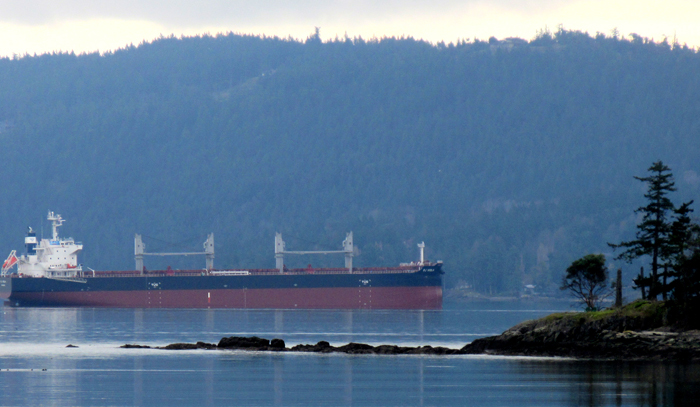BY PETER OMMUNDSEN
Record numbers of commercial cargo ships recently have been observed anchoring in the southern Gulf Islands, with some 27 ships anchored simultaneously, including 11 anchored around Salt Spring Island. A new report on air quality raises questions regarding this practice.
The Gulf Islands area is used as overflow for ships awaiting loading at terminals in the port of Vancouver, mostly for bulk grain and coal. Ship congestion is caused in part by delays in commodities arriving by train, and adverse weather conditions such as the January rains that postpone grain loading.
There has been a 10-fold increase in ships anchoring in the Gulf Islands over the past decade, despite only a 15 per cent increase in arrivals of bulk freighters at Vancouver. Export of bulk commodities from Vancouver has risen about 50 per cent, with larger ships becoming the norm. How do we explain the progressive increase of anchoring ship numbers in the Gulf Islands? How can bulk freighters now be widespread at anchor in our islands on a regular basis? The argument has been made that logistics at port are outdated and the scheduling of arrivals of incoming ships is inefficient and does not reflect modern methods.
A new report submitted to the Salt Spring Island Climate Action Council reveals that large commercial cargo ships anchored in the Gulf Islands can have a significant but largely unseen impact on our environment. While anchored, ships operate auxiliary diesel engines and boilers to provide energy for crew accommodations, instrumentation, heating, refrigeration, lighting and other uses. On a daily basis, a single anchored ship may burn two to three tonnes of fuel and emit 10 or more tonnes of carbon dioxide and other pollutants, including sulfur oxides and diesel particulate matter.
Exhaust from anchored ships undermines local clean air initiatives, including efforts at climate change mitigation. For example, carbon dioxide released during one day from a single anchored ship cancels out the greenhouse gas savings of driving an electric rather than gasoline vehicle for five years, or a family of four recycling plastic, glass, newspapers, food cans and magazines for a 10-year period.
Rising emission levels are also a concern for making our local ocean waters more acidic, with detrimental effects on marine life, in addition to stress by underwater noise and effects of anchor chains. The submarine coastal zone surrounding the shallow Ganges terrace on which ships anchor is designated as environmentally sensitive as shown on maps 10 and 20 of the Salt Spring Official Community Plan. The planning objectives for this zone include protection of “tidal waters that surround Salt Spring Island” and protection of “fish and wildlife habitat.”
Why are large polluting industrial ships being sent into an environmentally sensitive island archipelago that is supposedly protected by Section 3 of the Islands Trust Act? Inefficiencies at port causing this excessive demand for anchorages also create economic damage, as Canadian farmers must absorb the cost of tens of millions of dollars in demurrage paid to vessels sitting idle and delayed from loading grain.
Alternatives exist. Not only are upgrades needed for terminals and railway infrastructure, but there is a need for systems to schedule ship arrivals, and better management of limited anchorages at port. Ship congestion can be reduced by “just-in-time arrival” contracts. Adjusted lower speeds of incoming ships can translate into lower fuel consumption per kilometre, reducing air pollution overall, and eliminating the need for Gulf Islands anchorages.
Recent high numbers of anchored ships are a sign that cargo ship presence and pollution among our islands may continue if there is no public input. The Government of Canada Anchorages Initiative program could well designate yet more anchorages among the Gulf Islands.
Concerned citizens may consider contacting the federal ministers of transport, environment, and fisheries to request closure of the Salt Spring anchorages and request government support and oversight in synchronizing ship and commodity scheduling.
Further information, including the air quality report, can be found at ptis.info.
The writer served on the climate action council and contributed to the 2011 climate action plan.

